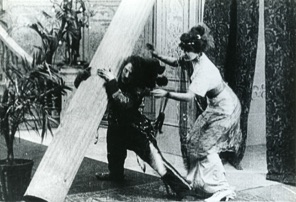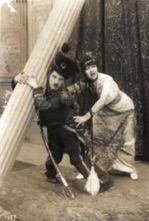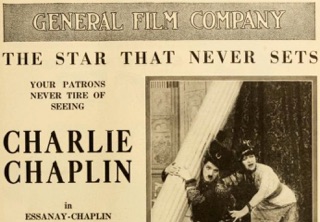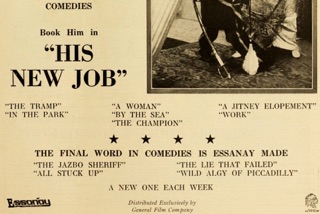Revival Advertisement, Moving Picture World, March 30, 1918
NEUER JOB 1/11
His New Job – Sein erster Film für Essanay,
sein einziger in Chicago. Und Chaplin karikiert gleich
mal die Filmbürokratie. Er hat Ben Turpin
als Partner. Er arbeitet zum ersten Mal mit Rollie
Totheroh an der Kamera. Clippings
Fritz Hirzel, Chaplins Schatten.
Bericht einer Spurensicherung. Zürich 1982
Mit Ben Turpin, der seinen Kleinbürgertyp mit der Noblesse
eines Seehunds verkörperte, liess es sich anders an.
Sein Zusammenprall mit Charlie war es, der in His New Job
für den ersten Höhepunkt sorgte.
Zwei gespannt vor der Tür des Studiomanagers harrende
Aspiranten, die beide auf eine Rolle im Film hoffen, nur dass keiner
sie sich vom anderen wegschnappen lassen will, sodass
Charlie, als die Türe aufgeht, buchstäblich über Turpins zuletzt
am Boden liegende Gliedmassen hinweg das Ziel, des
Managers Büro, als erster erreicht, freilich ohne eine Rolle
zu bekommen.
Charles J. McGuirk, Chaplinitis,
Motion Picture, New York, July & August 1915
When Chaplin first came to the Essanay studio, he almost
stopped the works. Every person in the studio – actors,
and actresses, property men, scenario writers, the publicity
department and even the business office – side-stepped
their tasks and stole down to the studio floor to watch the genius
apply his methods. Even then he was comparatively
unknown. The world had just begun to recognize that the
funny little man with original methods could make
whole audiences hold their abdominal muscles and go home
sore from uncontrolled laughter.
But the wiseacres in Moving Pictures knew Chaplin
and knew his possibilities. Hence the interest
that manifested itself in the Essanay studio and the impromptu
recesses that passed unrebuked. When Charlie
finally came on the floor, there was an audience that cluttered
entrances and lined itself stolidly and silently against
the studio wall. There were far too many on the floor. Chaplin
didn‘t notice it, but somebody else did. Orders came
forth, and the crowd melted. The comedian was ready to go
to work.
And do you know how he started his comedy,
His New Job? He stood out in the center of his set, pulled
three of his fingers out of joint, and then, crouching
into the professional dancer‘s pose, he executed a clog-dance.
He danced for five minutes while the actors and
actresses of the company that was to play with him gazed
at him. They didn‘t know whether he was crazy or
doing it just for their amusement. Some laughed; the rest were
dumb with amazement. As a matter of fact, they were
all wrong. Just why he did it will be told in an illustrated continuation
of this article in the August issue of this magazine.
(Continued from July Number)
We left Charles Chaplin in the July number, taking a few,
vigorous dance-steps prior to getting to work on his first
photo-comedy for the Essanay Company. He did it so seriously
that everybody wondered if he was out of his mind,
because it seemed entirely uncalled for. Francis X. Bushman
was among the interested bystanders – just a wee-bit
peeved, perhaps, to see this great bidder for world-popularity
stepping into the Essanay studio, where he had been
monarch o‘er all he surveyed – and he inquired the cause
of Chaplin‘s peculiar antics.
„Ah!“ he said, sotto voce. „Got to limber up. A little pep,
everybody; a little pep. Come on, boys. Shoot your
set. I‘m ready.“ The last sentence was shouted. Charlie went
thru a few other steps, and then sized up the situation.
He examined his set and then his actors. He gave them their
instructions as to just what they should do and just
when they should do it. He looked down on those $50,000 feet
of his, picked up one of them and stood like a stork
as he examined the shoe, put it down again, straightened up
and started to shoot a rapid-fire of directions, musings
and comments on the world of today. When any actor went
thru a piece of ,business‘ that appealed Charlie, he was
quick to step out, pat him on the back and tell him: „You‘re a bear.
Good stuff. You‘re goin‘ along right, old top. Keep it up –
keep it up.“
It took a little while, but Chaplin finally injected enough
enthusiasm into his people to make them work hours
without thought of time. The proof of it came at the noon hour.
Nobody knew it was twelve o‘clock. The first inkling
Chaplin had of it was when he noticed the augmented crowd
that eyed his efforts with all sorts of expressions on their
faces. „What‘s the idea? Why the party?“ Charlie exclaimed,
during a lull in the work. „By George! I‘ll bet it‘s twelve
o‘clock, ain‘t it, boys? Twelve o‘clock, sure as you live. That‘s all
for a while. Get out and get your lunches.“
The actors filed out, tired but very happy. Every one
who had worked with Chaplin that morning had the warm spot
in the heart that comes with the praise of work well done.
His New Job Clippings
Chaplins Schatten Neuer Job weiter zurück




